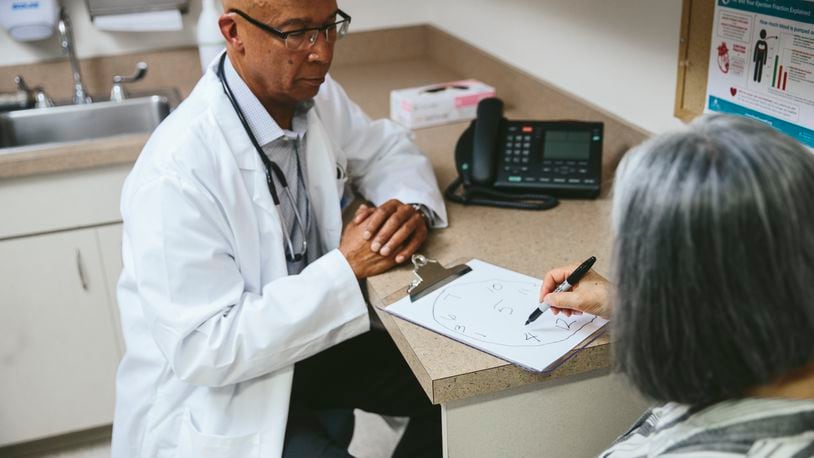An estimated 6.9 million Americans aged 65 and older have Alzheimer’s dementia, including 236,200 in Ohio. The number of Americans with dementia is projected to grow by nearly 14 million by 2060, according to the Centers for Medicare and Medicaid Services (CMS).
Impact of Alzheimer’s, dementia
Approximately 11.3% of Ohioans over the age of 65 are living with Alzheimer’s. There were 4,947 Ohioans who died from Alzheimer’s in 2021, the most recent year for state-by-state data, according to the Alzheimer’s Association, which also says Ohio’s mortality rate of 42% is higher than the national mortality rate of 36%. Alzheimer’s dementia is the 7th leading cause of death in Ohio.
This year, the cost of caring for people living with Alzheimer’s and dementia is projected to increase by $15 billion from a year ago, rising to $360 billion.
That cost does not include unpaid care provided by family caregivers. Last year in Ohio, there were 414,000 family caregivers, providing 624 million hours of unpaid care valued at $11.427 billion, the Alzheimer’s Association says.
Why are deaths increasing?
Multiple factors play into why deaths to Alzheimer’s disease and other forms of dementia are increasing, including how the health care system is getting better at treating other things like heart disease and cancer, one local doctor said.
“We’re living longer. We’re doing a better job of treating other diseases,” said Dr. Joseph Allen, a physician at Premier Health Family Care of Vandalia.
Since doctors are better at treating other diseases, people are surviving longer than they previously would have, he said.
“Unfortunately, a certain percentage of those folks will end up heading down the dementia road,” Allen said.
The testing for dementia has become more specific, he said, as doctors have become better at diagnosing.
“We’re identifying these things earlier,” Allen said.
Social systems and social determinants of health, such as transportation, can be barriers to accessing and navigating care. Finding the right medications and also paying for care and those medications can be difficult for families.
“Even the families who are well-versed in this that don’t have those stresses, it’s very difficult to navigate the system any how,” Allen said.
Unprepared health industry
Of primary care physicians caring for people living with Alzheimer’s, 55% say there are not enough dementia care specialists in their communities, according to the Alzheimer’s Association.
In Ohio, a 229.4% increase in this workforce will be needed to care for the state’s population by 2050.
The shortage of dementia care specialists is a barrier to diagnosis, and a lack of diagnosis means a delay in treatments, care delivery and support, the Alzheimer’s Association says.
Health care providers are saying the reimbursement and incentive system for dementia care is a big barrier, said Annemarie Barnett, executive director of the Alzheimer’s Association Greater Cincinnati and Miami Valley Chapters.
Dementia caregivers and health care workers are reporting difficulties in navigating dementia care within the U.S. health care system. Nearly half of health care workers, or 46%, say that their organizations do not have a clearly defined process for care coordination and clinical pathways for patients with mild cognitive impairment, Alzheimer’s disease or other forms of dementia.
In addition, 60% of health care workers surveyed believe the health care industry is not effectively helping families navigate dementia care.
“In Ohio, we have started an effort to build an expertise program to help health care workers increase their knowledge, their training, feel more comfortable with people with dementia and Alzheimer’s disease,” Barnett said.
National initiatives
Part of the challenge of helping unpaid caregivers and other organizations helping people with dementia, but aren’t necessarily long-term care facilities, is Medicare’s fee-for-service model.
To provide support to caregivers and health providers outside of the traditional realm of nursing homes, CMS has an upcoming pilot program offering alternative payment models for services that may fall outside of what CMS can pay for through fee-for-service.
Beginning in July 2024, health care providers who participate in this program will deliver supportive services to people living with dementia, including assessments and care plans, care coordination and 24/7 access to a support line. They will also provide access to a care navigator to help patients and caregivers access services and support.
“This really does speak to some of the struggles that we’re seeing currently in health systems regarding lack of reimbursement for this type of care delivery,” said Amy Boehm, senior health systems director, Alzheimer’s Association.
The program also offers reimbursement costs for respite services for qualifying beneficiaries with a caregiver up to a certain amount as caregiving impacts the caregiver’s health. In Ohio, 63.7% of caregivers reported at least one chronic condition, according to the Alzheimer’s Association.
The program is aimed at Medicare fee-for-service beneficiaries, including people who are dually eligible for Medicare and Medicaid, living with dementia.
In addition, eligible beneficiaries must not be residing in a long-term nursing home. They also cannot be enrolled in Medicare hospice benefit or Medicare Advantage.
The overall goals of this program include improving quality of life, reducing strain on unpaid caregivers, and enabling people living with dementia to remain in their homes and communities.
“We’re hoping that’s going to incentivize health systems and primary care workers to use this and really make that a little bit easier of a way to navigate through,” Barnett said.
About the Author
